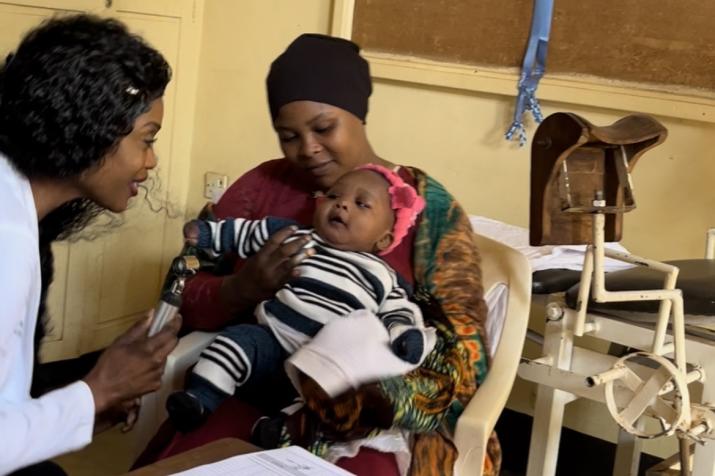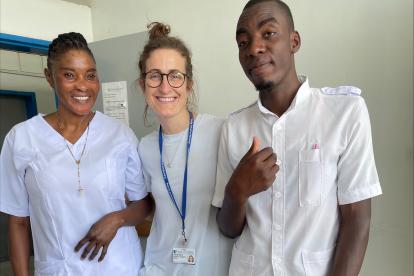
Kegt Vildor, a student in the Duke Doctor. of Nursing Practice program, treats a child in the Majengo Clinic in Tanzania during her global health immersion experience in 2022.
Published April 14, 2023, last updated on April 17, 2023 under Education News
Kegt Vildor thought she had seen everything in her nursing training. Then came a day when the Duke nursing student was working in a clinic in Tanzania, when the wife of one of her elderly patients presented her with a pillowcase. Inside was a live venomous green mamba snake, which had just bitten her husband.
A speaker of seven languages, Vildor used her Kiswahili, learned while working in Tanzania, to comfort her patient as she treated his snakebite with steroids and beta blockers. Recalling that his wife mentioned he is calmest when listening to the sound of birds, she played birdsongs from YouTube clips on her cell phone to soothe him.
Such stories underscore the profound value of hands-on experience, especially for healthcare providers looking to work internationally. For students like Vildor, who is completing the Doctor of Nursing Practice program at the Duke School of Nursing, Duke’s Graduate Certificate in Global Health has become an appealing route to exploring those interests.
Offered by the Duke Global Health Institute (DGHI), the certificate can be combined with many doctoral or master’s programs at Duke. The certificate requires three global health courses, one seminar and an optional immersion experience. Since opening to master’s programs in 2021, it has become especially popular with nursing students. Almost 30% of those currently pursuing the global health certificate are in nursing programs.
Nurses are the largest piece of the healthcare workforce pie, notes Michael Relf, Ph.D., associate dean for global and community health affairs at the Duke School of Nursing. He says global health experience provides an avenue to strengthen interprofessional learning, empowering nurses to use their voice, clinical assessment skills, leadership and advocacy from the bedside.
The hope is to prepare global citizens with skills to engage in global health, says Relf, who is a professor in both the School of Nursing and DGHI. “The opportunity for students to have a global health lens changes their perspective when working with those who have immigrated from other cultures or countries.”
Not all students can accommodate an immersive global experience, but for those who do, it can be transformative. Vildor, who spent seven weeks at the Majengo Clinic of the Kilimanjaro Christian Medical Centre (KCMC) in Tanzania, says her immersion was “one of the best in-country experiences that I have had within the structure of an organization.” She has returned on her own multiple times to continue the work, and after finishing her degree this May, she will spend the next two years working with KCMC.
“This isn’t just a project for a degree; this is a real-world project that will have real world implications,” says Betsy Smith, an occupational therapy nurse who completed a global health immersion en route to earning a Doctor of Nursing Practice degree in February of this year.
Smith, who worked in Haiti before coming to Duke, says she chose the Duke School of Nursing specifically for the global health experience. “I sought out a DNP to shift focus on healthcare to the macro level rather than continuing direct patient care,” she says.
Smith worked with a local rotary club to secure funding to complete her global immersion at the Bugando Centre in Tanzania. She says she was “blown away by the resources in the Bugando Centre and [those provided to me] through the program. That’s what I love about Duke, they are very willing to make connections.”

Betsy Smith with colleagues during her...
Immersion experiences are set up with Duke’s longstanding global partners and aare designed to be mutually beneficial, Relf says. “One team of students hands the work done off to the next cohort to foster sustainability.” Duke’s Office of Community and Global Health Initiatives offers grants and support to fund opportunities for students looking for global experiences.
For those looking to fulfill their immersion experiences closer to home, Duke maintains partnerships with local refugee organizations, where students work to connect families with medical care, help register children for school, and ease the transition to new systems and culture. As Relf says, “there are a variety of ways to engage in Global Health without ever leaving the triangle region.”
Wherever immersions take place, the point is to shift students’ perspective. Vildor emphasizes that life-altering experiences force people to evaluate what is important and appreciate what they have. “Global immersions objectively make you aware of the cultures in your own community; the whole world is essentially represented around you if your eyes are open to it,” she says.
Students can express interest in the global health certificate via this form or by emailing gh-education@duke.edu with questions about the program.


